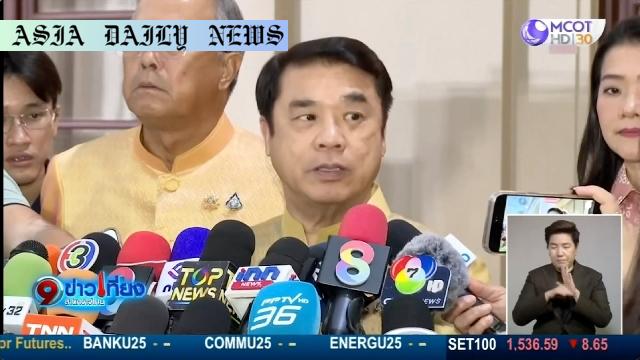Paetongtarn Suspension: Thai PM faces removal as the Constitutional Court begins reviewing her case amid rising political unrest.
Paetongtarn Shinawatra suspended as Thai PM after Constitutional Court takes up petition demanding her resignation.
Deputy PM Suriya Jungrungreangkit appointed acting PM amid political turmoil in Thailand.
Decision on Paetongtarn’s future could take a month, with potential for escalating protests and unrest.

Turmoil Surrounds Paetongtarn’s Suspension
The suspension of Thai Prime Minister Paetongtarn Shinawatra has thrown the country’s political landscape into chaos. On Tuesday, the Constitutional Court decided to move forward with a petition demanding her resignation, leading to her immediate suspension. This dramatic turn of events unfolded amid growing controversy over a leaked phone call involving Paetongtarn and Cambodia’s Senate President Hun Sen, which inflamed existing tensions in the Thai political sphere.
Deputy Prime Minister Suriya Jungrungreangkit, who also serves as Thailand’s transport minister and a prominent figure within Paetongtarn’s Pheu Thai Party, has been installed as acting prime minister. This puts Thailand’s fragile coalition government, currently led by the Pheu Thai Party with a razor-thin parliamentary majority, in a precarious position. The ripple effects of this shake-up are expected to extend beyond Thailand’s government corridors, directly impacting the general public and governance concerns.
Potential Long Road to Verdict
The Thai Constitutional Court is expected to take at least a month to reach a verdict regarding the petition calling for Paetongtarn’s removal from office. Analysts are already warning of turbulent political fallout regardless of the court’s decision. The suspension has emboldened opposition groups, with protest leaders who were actively calling for Paetongtarn’s resignation applauding the court’s move. Demonstrations are expected to intensify in August, with plans for a large-scale gathering already underway. Social and political movements of this scale could further destabilize the country’s fragile foundations, prolonging public and policy gridlock.
The unforeseen leadership shakeup raises significant queries about long-term stability should the court eventually decide Paetongtarn’s fate. The potential for increased unrest, paired with an already divided coalition government, makes the current political climate in Thailand exceptionally tenuous.
Historical Context and Broader Implications
Paetongtarn’s suspension is reminiscent of other dramatic shifts in Thai politics, a country that has experienced multiple coups and constitutional court interventions in its fragile democratic journey. These historical echoes cast a shadow over the potential cascade of events expected in the coming weeks. Public indignation towards governmental leadership, amplified by fresh allegations and leaks such as that involving Cambodia’s Hun Sen, underscores the volatility of Thailand’s political scenario.
In addition to domestic instability, the ongoing political developments may also carry implications for Thailand’s international standing. Regional countries and global powers will be closely monitoring the situation, particularly in the context of ASEAN relations. Economic fallout is likewise a growing concern, with the possibility that political chaos could hamper trade and foreign investment, further impacting Thailand’s prospects for recovery and growth.
Overall, the interplay of public sentiment, institutional decisions, and international perceptions creates a highly complex backdrop for Thailand’s current political chapter. It remains imperative for the nation to tread carefully as it navigates this crisis.
Commentary
The Judicial Angle and Its Broader Ramifications
The recent suspension of Thai Prime Minister Paetongtarn Shinawatra brings to light significant questions about the role of constitutional courts in mediating political processes. While judicial oversight is a critical check in democratic systems, it must be wielded responsibly to maintain both legitimacy and public trust. In Paetongtarn’s case, the decision to proceed with the petition for her resignation reflects a vital mechanism of accountability. However, the potential for escalating unrest underscores the delicate balance between adhering to the rule of law and considering the societal impact of political decisions.
Should the Constitutional Court’s deliberations stretch across weeks or months, as anticipated, the frequent delays could serve to exacerbate Thailand’s fragile political landscape. This situation is especially delicate given Paetongtarn’s place within the Pheu Thai Party, a coalition government already walking on political thin ice. Such delays not only diminish governmental efficiency but also potentially alienate the public further, fostering dissatisfaction and eroding political stability.
What Lies Ahead for Leadership in Thailand?
The appointment of Deputy Prime Minister Suriya Jungrungreangkit as acting prime minister introduces yet another complexity to the unfolding political drama. While Suriya’s leadership, even on an interim basis, attempts to remedy the immediate vacuum left by Paetongtarn’s suspension, his dual role as transport minister may raise concerns over his capacity to manage both portfolios effectively.
Moreover, opposition protests likely fueled by this recent development could lead to widespread disruptions, not just at a governmental level but also among Thailand’s everyday citizens. Transitioning leadership during a time of such turbulence is inherently destabilizing, and the pressure will be on Suriya and his cabinet to act decisively while maintaining calm. Ultimately, leadership integrity and a deep-rooted focus on national interests will bear critical importance moving forward.
Integration of Protest Movements and Institutional Accountability
An undeniable factor in Thailand’s political scene is the role of civil society and protest movements as mechanisms of expressing grievances and demanding change. The protest leaders calling for Paetongtarn’s resignation clearly view her suspension as a milestone, but their next steps remain crucial. Peaceful demonstrations, coupled with clear communication of objectives, will be vital in bridging gaps between public will and governmental action.
On the other hand, the Thai government and judicial institutions must also demonstrate accountability and transparency during the court’s deliberations. Prolonged ambiguity about Paetongtarn’s fate could serve to prolong public dissatisfaction, perpetuating broader instability. Conversely, timely and clearly communicated verdicts, supported by justifiable evidence, could chart a more promising path forward.


